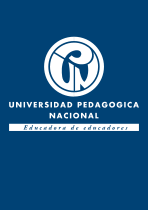Referentes conceptuales : soporte para una educación universitaria constructora de paz.

Citación
Fecha
2020-12-11Autor
Tatar Garnica, Francy Yamile
Vargas González, Jorge Enrique
Enlace al recurso
https://revistas.pedagogica.edu.co/index.php/RCE/article/view/6945Metadatos
Mostrar el registro completo del ítemResumen
Una educación universitaria comprometida con la paz debe apoyarse en el conocimiento dispo-nible en el mundo académico e investigativo sobre el tema. De allí que los autores de esta inves-tigación documental se propusieron como objetivos escrutar el concepto de paz y comprender el alcance y significado de la construcción de paz. La metodología asumida se relacionó con las ciencias del lenguaje y el diseño implicó técnicas y protocolos como el fichaje y las matrices para la organización del estado del arte que permitieron, a su vez, la aplicación de procesos de análisis y de síntesis: se precisaron fragmentos de los textos y luego se definieron las categorías. Final-mente se reunieron los que planteaban ideas similares y se hizo una síntesis de lo planteado. Entre los resultados derivados, se encuentra que los primeros estudios se concentraron en las causas de la guerra para tratar de prevenirla; después se desarrolló el concepto de paz negativa (ausencia de guerra) y más recientemente el de paz positiva (transformación para la convivencia, la libertad y la justicia). Desde la óptica de la paz se examinaron los conceptos de paz positiva, negativa, cultural, neutra, imperfecta y feminista. A continuación, se preguntó sobre los logros investigativos en torno a la construcción de paz y se apreció que estos avanzaron inicialmente alrededor de los conceptos de peacebuilding, peacemaking y peacekeeping; luego se vieron enri-quecidos y profundizados con tres tipos de aproximaciones teóricas que pueden clasificarse en maximalistas, minimalistas y mixtas. El universo investigativo teorizado en torno a la paz amerita la participación de los líderes, las organizaciones y los ciudadanos involucrados en la construc-ción de paz, pero en este caso no se aspira un tono prescriptivo sino de apoyo referencial al servicio de la educación y el contexto universitario.
Abstract
university education committed to peace must be supported by the knowledge available in the academic and research world on peace. Hence, the authors of this documentary search aimed to scrutinize the concept of peace and to understand the scope and meaning of peace-building. The methodological approach adopted was related to language sciences, and the design involved techniques and protocols such as filing and matrices for the organization of the state of the art which, in turn, allowed the application of processes of analysis and synthesis. First, the researchers defined the passages to be used, and defined the categories. Then, they put together those which introduced similar ideas, and summarized their core proposals. According to the findings, the first studies concentrated on the causes of war in an attempt to prevent it. Later, the authors developed the concept of negative peace (absence of war), and more recently that of positive peace (transformation for coexistence, freedom, and justice). The concepts of positive, negative, cultural, neutral, imperfect and feminist peace are examined from the perspective of peace. Consequently, the authors inquired about research achievements concerning the construction of peace. It was found that these advanced initially around the concepts of peacebuilding, peacemaking and peacekeeping, and were enriched and deepened later with three types of theoretical approaches that can be classified as: maximalist, minimalist, and mixed. The research universe theorized around peace is worthy of the participation of leaders, organizations, and citizens involved in peacebuilding. However, in this case it does not pretend to reach a prescriptive tone, but rather a referential background at the service of education and the university context
Editorial
Editorial Universidad Pedagógica Nacional
